- Home
- Peter Ackroyd
The Fall of Troy Page 19
The Fall of Troy Read online
Page 19
She looked up at the charred and still smouldering thatch. “It must have been the lightning,” she said. “I saw it over Kannakale.” Sophia glanced around for Obermann. She could see him in the distance, behind a ridge, superintending the covering of the stones with canvas cloths.
“I cannot say if lightning was responsible. I cannot say that.” He gazed at her steadily, and at once she understood what he meant. He suspected some human agency. “I woke up to the heat of the flames. Just before this terrible storm broke around us. But I had no chance to save them. The rain—” He looked for a moment as if he were about to weep. “Everything gone. My drawings, too. They have been destroyed.”
“Let me see.”
He took her inside, and she saw the tablets reduced to glutinous dark brown clay. Thornton’s drawings had been charred by flame and soaked by the tempest.
“Everything destroyed,” he said again. “As if the tablets had never been.” The torrent still fell upon them. “That is what he wanted.”
Sophia peered into the remains of Thornton’s quarters, in the hope that some tablets or drawings had survived. Then she sensed a slight movement on Thornton’s bed, and turned her head towards it; a small brown adder was moving across his pillow. She took his arm and pointed. “Look. There. The snake. Antelion.” It writhed over the white linen cloth, and they both stepped back. “We must leave this place,” she said urgently. “We must leave now.”
“But your husband—”
“He is not my husband!” she whispered to him then, as if she could hardly trust her own words. “He is trying to kill you.”
“What?”
“The snake. It will not have been here by chance. I know that he seeks them out.”
For the first time he appeared to be frightened. “What shall we do?”
“Come. We must go now. He has not seen us.”
“But my—”
“Take your passport and all your money. I will join you in moments.”
She ran to the quarters that she shared with Obermann. He was still busily occupied with the preservation of the site from the storm, and had not noticed her arrival. She rushed into the little hut, and retrieved the jewels that she had brought with her from Athens before running out again into the storm.
Thornton was waiting for her, alerted by her energy and determination to leave Troy. “Take a horse,” she shouted, “and follow me.”
Then they rode in the streaming rain towards Kannakale. Another lightning flash lit up the plain. It had become a marsh, with a ridge of hard ground on which they rode. The rain veiled their retreat so that no one saw them leave, except the boy who ran errands for Obermann.
WHEN THEY ARRIVED at the Central Hotel, the proprietor looked at them with alarm. He spoke to Sophia in Greek. “Madame Obermann, why do you ride through this fearful storm?”
“There has been a fire,” she said. “We are here for refuge.”
“A fire? Was there injury?”
“No, none whatever. Do you have a room for Mr. Thornton? He is an Englishman, working for Heinrich Obermann.” She pronounced the name very crisply.
“Of course. Now you must dry yourself and change your clothes. The storms of this region cause sickness.”
They were given towels as soon as they entered their rooms. Thornton was lent the blouse and wide trousers of the Turkish workman, and Sophia dressed herself in the black garb of the local women.
“We are natives,” she said, as soon as Thornton had opened the door of his room to her. “Does it suit me?”
He was surprised by her gaiety in these circumstances. “You have no fever, I hope.”
“Fever? I have never felt so well in my life!” She laughed at his expression of concern. “We have made a decision.”
He pulled up a chair for her, and sat opposite to her. “Do you know what we have done?”
“Of course. We have slain the dragon.”
“We can never go back.”
“Do you really wish to go back? He tried to kill you.”
“The snake may have entered during the storm.”
“He has destroyed the tablets.”
“That may have been an accident, Sophia.”
“There are no accidents in Troy.” They were speaking rapidly and urgently to one another.
“You said that he was not your husband.”
Then she told him the story, to which he listened with great attention.
When she had finished, he sighed. “So he has brought this woman—”
“His wife.”
“He has brought his wife with him in the care of servants. I wonder how she lost her mind.”
“I do not wish to know.”
“And are you sure that Leonid is her son?”
“He called her Mother, Alexander. I think that is proof enough, don’t you?”
“He does resemble Obermann. I see that now. But I never guessed—”
“No one could have guessed it.”
“Of course, that is why he calls him Telemachus. The son of wily Odysseus.”
“I wanted to confront him. To attack him. But you are right. I cannot go back.”
At that moment the strangeness of Thornton’s situation became obvious to him. “I have no reason to go back. He has destroyed my work. If we had been seen to leave—”
“It would be compromising?”
“Naturally.”
“For a man and a woman to ride off in a storm?”
“And,” he said, “he will soon know that our passports and money have gone with us.”
She stood up, and went over to the window. The torrent still fell upon the deserted streets of Kannakale. “We will go to Constantinople. There we will be invisible until we decide what to do. You must return to England, of course.”
“And you, Sophia?”
“I have no notion.”
“Will you go back to Greece?”
“I have been Obermann’s whore.” Thornton blushed deeply. “Who will want me there? My parents have relied upon his money. They will not thank me for returning.”
“We can be married, Sophia.” He said it lightly, almost casually. “I might say that it is to save your reputation, but that would be an insult to you. I wish to marry you.” She turned back from the window, and stared at him. “I know a clergyman in London who will be sympathetic. No one knows you there.”
“No one knows my history? But I will be a hindrance to you.”
“I cannot think of a more agreeable fate.”
She believed that he was offering to marry her out of sympathy, to give her legal status and a name. “Is it easy to be granted a divorce in England, after a decent interval?”
“I have said nothing about divorcing you.”
She looked at him, uncertain how to respond. “I don’t understand you, Alexander.”
“I am happy for you to be my wife. I want you to be my wife.”
“But we scarcely know one another.”
“I have watched you, Sophia, as I once told you. I have seen you in the shadow of that man. I have talked to you. I have shared my discoveries with you, and seen the same enthusiasm in your eyes. That place is like some testing ground. I know you as well now as if I had known you for a hundred years.”
“A hundred years would be too long.” She did not know how to respond to him. “We would have tired of each other.”
“I could never tire of you.”
“I am not a virgin, Alexander.”
“Are you carrying his child?”
“No. I think not.”
“That is enough for me.”
“And what of him?” she asked.
“He will bark and bluster,” Thornton replied, “but he will do nothing. It would be intolerable to his pride to let it be known.”
“He is a bigamist. In Greek law he would be imprisoned.” She hesitated for a moment. “But what if he had divorced the Russian woman?”
“He cannot have divorced her for the reason of insanity. There is
no such plea. That is the case in England.” He was thinking of one of his colleagues in the museum, who had been obliged to place his wife in a private mad-house in Hoxton. “Would he keep her close, in the care of his own servants, if he had long since divorced her? It is over, Sophia. You will never see him again.” During the course of this conversation they had steadily drawn closer. They might have touched, but they did not.
“And your work?” she asked him.
“My work here is over. I am sure that I can repeat from memory many of the symbols, but what kind of evidence is that? They might have come from an over-eager imagination. I have no proof or record of any kind.”
“But surely you can explain what you believe?”
“It would be a foolish exercise, Sophia. Obermann would laugh at me.”
“Do you think that he deliberately destroyed everything?”
“Otherwise, as you say, there is too much coincidence. I heard the thatch catch fire moments before the storm broke. I was aware of no lightning flash. I saw nothing of the kind. What could have been easier for him than to set fire to the thatch when he saw the rains coming?”
“In that atmosphere a lighted candle would have been enough.”
He leaned over and, for the first time, kissed her lightly on the forehead. “And you believe that he introduced the snake?”
“He watches those snakes with glee. He loves their deadliness.”
“There were enough cracks and fissures in the stone for one to crawl through. But why kill me?”
“Don’t you see? He is a child. He cannot bear contradiction. He cannot bear rivals.”
“He could not endure the thought of Troy—”
“His Troy, Alexander.”
“Of his Troy being demolished. He saw an army of Homeric heroes. I saw a tribe of alien people who cultivated human sacrifice.”
“That was intolerable for him. Troy has become his very existence.”
“What will he do now?”
“He will carry on working. He will not rest. When he has revealed the whole of the ancient city, he will move on. He will find some other sacred place.”
“He will dismiss the tablets as if they had never existed.”
“He will have forgotten them already.” She shivered suddenly. “The rain has penetrated us.”
TWENTY-SIX
Obermann had been busy preserving the excavations from the fury of the storm, and the entire day had been occupied in laying down sheets of canvas as well as makeshift shelters of wood and corrugated metal. “Now,” he said to Lineau, “it looks like the battleground of Sebastopol. But we have defeated the enemy.” He was looking at Thornton’s burned and damaged hut. “I have not seen Mr. Thornton since the tragedy. He will be desolate.”
“So are we all. Kadri Bey tells me that the lightning has destroyed everything.”
“Where the rain entered there is only mud. You have been to Thornton’s quarters?”
“I could not bring myself to enter. I could not bear the waste of all his hopes.”
“Your sensitivity does you credit, Lineau. Yet I wonder why he has not appeared. I will send the boy to him.”
“The English are prone to self-slaughter.”
“I doubt if that is Thornton’s case. He is too stubborn. Rashid, come here. Call Mr. Thornton. He is unhappy. If he is not there, see if he is wandering among the rocks. But be careful. The storms bring out the snakes.”
Rashid shook his head. “He is gone, sir.”
“Gone? Gone where?”
“He was on horseback. Madame was travelling with him. Towards Kannakale.”
“You must be dreaming, Rashid. Madame is already in the town. She left yesterday.” Again the boy shook his head. “Very well. I will investigate the mysterious disappearance of Alexander Thornton.”
He walked over to Thornton’s quarters, now ruined and partly open to the sky, and as soon as he entered he knew that the Englishman had gone. Although he had laughed at Lineau’s mention of the English tendency to suicide, he looked carefully in the little alcove off the main room. “He has fled,” he said to himself. “Well done.” And then he thought of Sophia. It was impossible that she should have returned and left again, so swiftly and so silently.
He heard the sound of Leonid’s horse before he saw Leonid himself, exhausted and sodden with rain. “You should have stayed at the farm, Telemachus. There was no need to ride through the storm.”
“Every need.”
LEONID HAD DELAYED his departure from the farm of Theodore Skopelos. He feared his father’s wrath. As soon as Sophia had seen him with his mother, he knew that everything would change. He had not meant to disclose that the woman was his mother, but he had called to Sophia by instinct. He could not deny the connection. He loved his mother, even in her madness, and could not betray her in her presence. So he had stayed that night at the farm, considering the best course of action. Even though the storm had begun on the following morning, he knew that he had to return to Troy and face the consequences of his disclosure.
“WHAT IS THE MATTER with you, Telemachus? You look as if you are about to be hanged.”
“I have something to tell you.”
“Well, what is it?”
“Sophia has visited the farm.”
“I know it. She travelled there two months ago. What of it?”
“She came again yesterday. Unexpectedly.”
“Oh?”
“She saw Elena.”
“I beg your pardon?”
“She knows.” Obermann stared wildly around at the excavations. “She came upon us quietly. She heard me call her Mother.”
Obermann walked a short distance away, and bowed his head as if he were in profound thought. Then he raised his face to the sky and let out a great cry of horror and anguish that startled the Turkish workers. It was rumoured among them that Herr Obermann had lost many treasures during the rainstorm. When he came back to Leonid, he was more composed. “When precisely did this happen?”
“In the late afternoon.”
“Yet you have waited this long to return.”
“I was ashamed.”
Obermann hit him hard on the side of his face. “Never feel shame, Telemachus. Feel grief. Feel sorrow. But never feel shame. It is the enemy.”
Even as he spoke he began to understand what had happened. Rashid had been right. Sophia had returned to Troy, in her anger, and had encountered Thornton. They had decided to flee together—to flee Obermann, and to flee Troy. Their rage and their despair had united them against him. It was as clear as if he had heard every word spoken between them.
“How was your mother?”
“She was excited by the sight of Sophia. She could not sleep.”
“Yes. Sophia has that effect on others.” He called for Rashid, and asked him to repeat what the boy had already told him. “They were on two horses, you say?” The boy nodded. “And they were riding towards Kannakale. You are sure of that?”
“They took the old path. I watched them until the rain hid them.”
“You must go to Kannakale, Rashid, and find them. Do not approach them. Say nothing to them. But discover where they are hiding and then return to me. Do you understand?”
“Yes, sir. May I take Pegasus? He is swift.”
“Ride like the wind, Rashid. I expect you to return before nightfall.” The boy ran off, delighted by the chance to ride the Barbary. “Well, Telemachus, what is your plan?”
“It is not for me—”
“No, Telemachus. It is not for you to say. You have done enough harm.”
“That is unfair, sir. You insist that I visit her. You will not see her yourself. Am I to blame that she is my mother?”
“Softly, softly. There is no blame. I know that. This is the pattern of the Fates. They alone dare oppose the sovereign will of Zeus. Clotho spins the thread. Lachesis weaves it. And Atropos cuts it.”
Leonid looked at him barely able to conceal his surprise. “And you are Zeus
?”
“We are all gods, Telemachus, when the occasion demands it.” He said nothing for a moment, digging the tip of his shoe into the loose earth. “Did your mother realise that Sophia—”
“Who knows what the mad understand? She howled after she had gone.”
Obermann put his hand up to his face. “She is not spared grief, even as she is.”
AT DINNER THAT NIGHT, with Lineau and Kadri Bey, Obermann seemed to Leonid to be particularly animated. He remarked upon the absence of Alexander Thornton, explaining to them that he had spoken with the Englishman shortly before his departure. He had decided to return to England. Mr. Thornton had travelled to Kannakale in order to arrange transport at the shipping office for his journey. Sophia had been detained, no doubt waiting for news after the storm, but she would arrive soon. On this matter Lineau and Kadri Bey were silent. Both men suspected another explanation for the Englishman’s absence with Frau Obermann. But, of course, they could not speak of it. “He has no wish to remain here,” Obermann was saying. “The loss of the tablets has affected him deeply.”
“It has affected us all,” Kadri Bey replied. “It is the greatest blow we have suffered here.”
“There are elements of tragedy in this.” Lineau seemed to be staring straight ahead. “It is difficult to comprehend what it means.”
“Why so melancholy, gentlemen? For all we know, they were only the lists of goods.”
“Only?” Lineau turned towards Obermann, who was momentarily unsettled by his sightless gaze. “It was our first glimpse into an unknown world. It was a momentous discovery.”
“And who is to say that we will not find more?”
“If any have survived the storm.”
“There will be other sites and other places where they lie concealed. Be more cheerful, Lineau. All is not lost. All my life I have retained my optimism. That is why I have been so successful.”
“Can nothing of them be recovered?” Kadri Bey asked him. “Have Mr. Thornton’s notes been saved?”
“Alas not. His notes were scattered in the storm. Those we have found are illegible. Have some more of these anchovies, Lineau. Telemachus, you have hardly eaten.”

 The Clerkenwell Tales
The Clerkenwell Tales The Canterbury Tales
The Canterbury Tales J. M. W. Turner
J. M. W. Turner Chatterton
Chatterton The Canterbury Tales – A Retelling
The Canterbury Tales – A Retelling Alfred Hitchcock
Alfred Hitchcock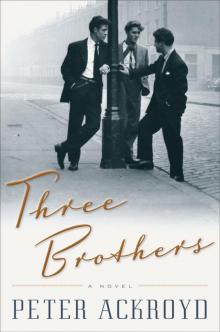 Three Brothers
Three Brothers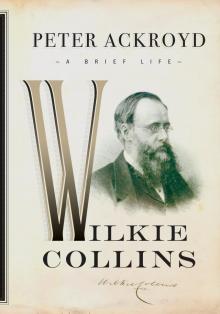 Wilkie Collins
Wilkie Collins Venice
Venice Poe
Poe The Lambs of London
The Lambs of London London
London Queer City
Queer City Revolution, a History of England, Volume 4
Revolution, a History of England, Volume 4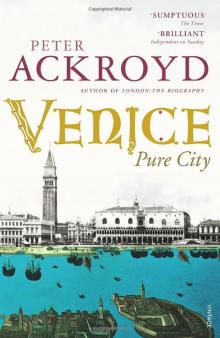 Venice: Pure City
Venice: Pure City Foundation
Foundation Thames
Thames The Plato Papers
The Plato Papers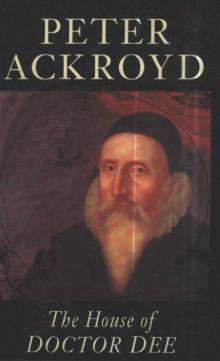 The house of Doctor Dee
The house of Doctor Dee Rebellion: The History of England from James I to the Glorious Revolution
Rebellion: The History of England from James I to the Glorious Revolution Albion: The Origins of the English Imagination
Albion: The Origins of the English Imagination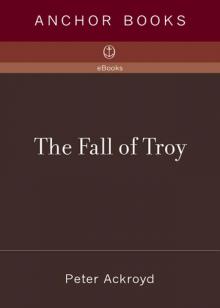 The Fall of Troy
The Fall of Troy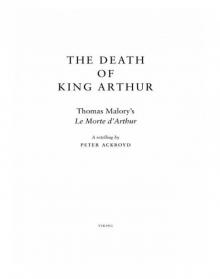 The Death of King Arthur
The Death of King Arthur The Trial of Elizabeth Cree
The Trial of Elizabeth Cree London: The Biography
London: The Biography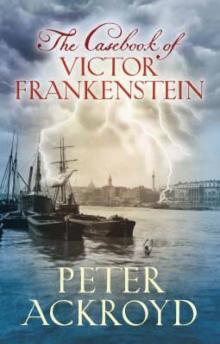 The Casebook of Victor Frankenstein
The Casebook of Victor Frankenstein Hawksmoor
Hawksmoor Charlie Chaplin
Charlie Chaplin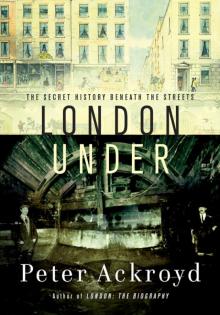 London Under
London Under